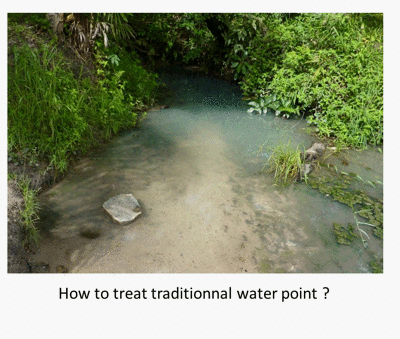Small communities (less than 150 persons) are generally out of the scope of WASH interventions because the investments for a new construction becomes expensive compare to the number of beneficiaries. Moreover, it represents a big workload and it is difficult to have enough people for community participation to build a well.
Beside this, there are some communities for whom it is too difficult to build a well (topographic reasons – village on top of hills, water table too low, rocks layer that makes difficult the digging of a well, etc.). There are also villages who are benefiting from a well only during rainy season because it gets dry on dry season (difficult to dig more and other reasons).
Therefore, one option to help these villages is to develop self-supply solutions such as household water treatment. Villagers can filter and then chlorinate water from their local source or well.
Inter Aide initiated such approach in the north of Bombali district in 2011 with very few villages, to progressively cover more than 100 small communities in the whole district. The team is training water committees who can chlorinate the water fetched by the rest of the community. This committee is also train to collect and manage money to get refill of chlorine through a network of chlorine providers which is reinforced in parallel.
The uptake of the villagers has been quite quick, observing the real impact on their health and the decrease of diarrhea. The approach is under extension in more villages and other districts…




